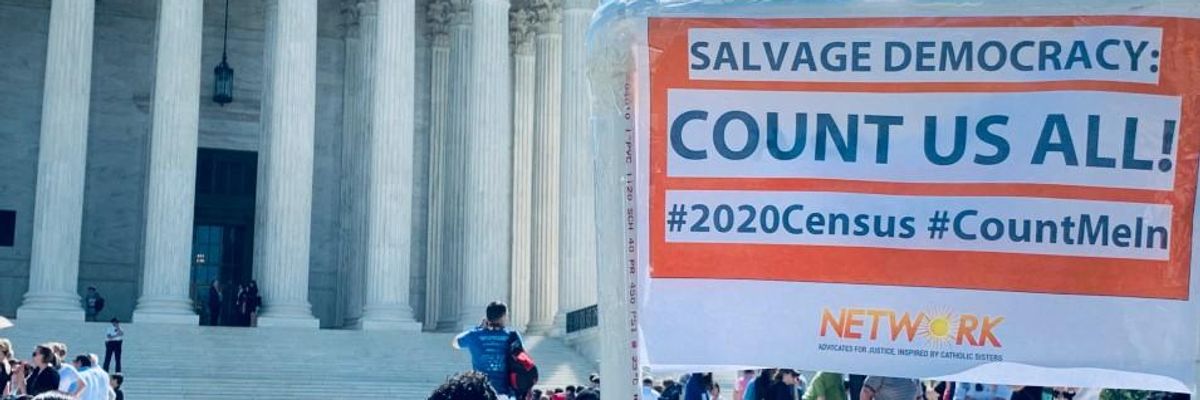In what one expert described as "an absurd filing," the Trump administration told a federal judge on Friday that the Justice and Commerce departments "have been asked to reevaluate all available options" for including a citizenship question on the 2020 census, an effort which was effectively blocked by the U.S. Supreme Court last week.
The Supreme Court temporarily prevented the inclusion of the question on the grounds that the alleged rationale for doing so appeared "contrived," a ruling which was cautiously welcomed by civil liberties and immigrant rights groups who accused the administration of attempting to rig the next national survey to create an electoral advantage for "Republicans and Non-Hispanic Whites."
On Tuesday, a spokesperson for the Justice Department confirmed that the census would not include a citizenship question and Commerce Secretary Wilbur Ross said that "the Census Bureau has started the process of printing the decennial questionnaires without the question."
However, hours after Trump tweeted Wednesday morning that reports of Commerce dropping its quest to add the question were "FAKE" and "we are absolutely moving forward," Maryland U.S. District Judge George Hazel ordered the administration to provide an official update to the court by 2pm Friday.
The deadline provoked the Justice Department's Friday filing (pdf)--which, as BuzzFeed's Zoe Tillman explained in a Twitter thread, is not definitive and means that for now the Census Bureau will proceed with printing the census forms without the question.
Noting that the filing reveals the Justice Department's "lawyers have been instructed to devise/fabricate a new reason for imposing a citizenship question," Kristen Clarke, head of the National Lawyers' Committee for Civil Rights Under Law, said the development "marks a new low point for the federal government."
"This is complete politicization of DOJ's work being done to carry out the naked political and discriminatory goals of the White House," she added.
Summarizing the filing, Rick Hasen--a professor of law and political science at University of California, Irvine--tweeted: "This is par for the course with this administration: Sorry if we were acting with discriminatory intent before. Give us a do over and we'll do a better job hiding our real intent."
In response to the filing, voting rights expert Ari Berman reported for Mother Jones that "Hazel reopened discovery in a case looking at whether the administration added the question to intentionally discriminate against Hispanics, based on smoking-gun evidence, uncovered after the death of the GOP's longtime gerrymandering mastermind, Thomas Hofeller, showing that he had pushed for the question in order to draw new political districts that he said would be 'advantageous to Republicans and Non-Hispanic Whites.'"
Hazel wrote in his court order, according toHuffPost, "Plaintiffs' remaining claims are based on the premise that the genesis of the citizenship question was steeped in discriminatory motive... Regardless of the justification defendants may now find for a 'new' decision, discovery related to the origins of the question will remain relevant."
The DOJ filing and Hazel's subsequent decision came after Trump told reporters earlier Friday that he was considering an executive order as one of "four or five" ways he believes the administration can force through the question.
The president also told reporters Friday that the question is needed "for many reasons," but "number one, you need it for Congress. You need for Congress, for districting." Trump's statement contradicts the rationale the administration's lawyers argued in court (that the question was needed to improve enforcement of the Voting Rights Act) and seemed to reveal the administration's real intent behind the question is precisely what civil liberties and immigrant rights groups have charged all along.
As Popular Information founder Judd Legum put it, "This really gives up the game."
Others concurred--including Washington Post political reporter Aaron Blake and Ashley Shapitl, a spokesperson for Sen. Dianne Feinstein (D-Calif.).
Rep. Ted Lieu (D-Calif.) tweeted Friday that he was pleased Trump "has made it even harder now to include the citizenship question" on the next census.
"Drawing congressional districts based on 'citizens,' rather than 'persons,' is unconstitutional," Lieu added. "Trump has now stated the real reason, and that reason is unconstitutional."

